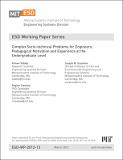Complex Socio-technical Problems for Engineers: Pedagogical Motivation and Experience at the Undergraduate Level
Author(s)
Siddiqi, Afreen; Clewlow, Regina; Sussman, Joseph M.
Downloadesd-wp-2012-13.pdf (2.477Mb)
Metadata
Show full item recordAbstract
Engineering courses, focused on complex, large-scale, sociotechnical systems, at the undergraduate level, have been rare. Traditionally, most students develop a deep technical understanding in a specific engineering discipline, but get little opportunity to analyze engineered complex systems, where both technical and social issues need to be well understood for devising long lasting solutions. The development of analytical skills for studying interdisciplinary problems has so far been largely limited at the graduate-level. In this paper we describe the motivation, design, and learning outcomes of an introductory course on Engineering Systems that has been developed and offered to primarily first and second year engineering students at the Massachusetts Institute of Technology. The course has been centered around the theme of critical contemporary issues (CCIs) including energy, mobility, sustainability etc. The aim of the course is to expose undergraduates to quantitative tools that are available for rigorously and methodically analyzing some of our most complex contemporary engineering challenges. The course consists of introductory lectures on system dynamics, networks and uncertainty, along with semester-long team-based projects. The projects focus on different topics related to CCIs and the students work in small teams on a project of their interest throughout the term. For the first pilot offering of the class (in Spring semester 2011), the students gave an average rating of 5.9/7.0 regarding how likely they were to recommend this class to others (with 7 being absolutely certain). There was also evidence (however based on limited and anecdotal data) of continued student interest (outside of class) in engaging with the complex socio-technical problems they worked on during the term.
Date issued
2012-03Publisher
Massachusetts Institute of Technology. Engineering Systems Division
Series/Report no.
ESD Working Papers;ESD-WP-2012-13